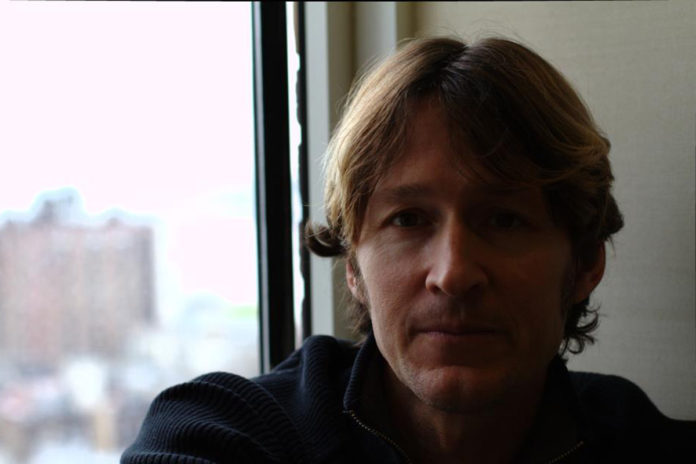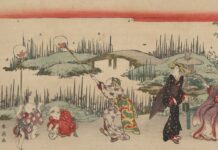The power was down more often now. The only way Gill could tolerate the heat was to sit under highway overpasses, shielded from the sun but open to whatever breeze there might be. Under the M62, in front of the Irwell Hospital courtyard in Manchester city center, he scrolled through his phone for an hour and then napped. Ian found him there and waved as he approached.
“That mate of yours meeting us today?” he asked.
“He’s not my mate. He’s just a bloke I know.”
“We been waiting a week already,” Ian said. “I need that permit.”
“He says he’s coming.” Gill coughed into the crook of his arm. “But like I said, he ain’t really my mate.”
They watched a dog trying to cross in the open sun from the hospital courtyard to the shade of the old orchestra shell in Riverside Park. The dog hopped from foot to foot on the steaming tarmac and broke into a trot.
Ian waved his hand like it didn’t matter. “Mate, you working at Harbour Towne still?”
“Only part time. My manager cut me down to three days,” Gill said.
“You still sweeping up and shit?”
“At least it’s a job.”
A loud metallic click echoed around the courtyard as the Public Venue speakers powered up and broadcast a recorded message. There was an update about A51: it had mutated again, and they were recommending a new booster.
“I never got the first jab anyway,” Ian said.
“I’m just gonna let it burn out,” Gill said. “Ain’t fatal unless you’re weak or old.”
A group of young kids, aged eight or nine, began playing football by the trains, taking turns playing goalkeeper in the goal they’d made by leaning a discarded box spring against one of the British Rail cars. The cars were made of fiberglass and had a bright blue gelcoat that resisted graffiti and the sun. They hadn’t run in a decade, but still looked almost new, gleaming in a landscape of oxidized metal and weather-powdered concrete.
“Too hot for football,” Gill said.
“Mate, can you get me any work there at your place?” Ian asked.
“At Harbour Towne? You’re too old,” Gill said, regretting it instantly.
“Fuck’s sake, I’m only forty-six. If that mate of yours ain’t gonna turn up, mans needs to get a job.”
“He’s not my mate,” Gill said. “I didn’t mean you were old. It’s just my manager don’t hire anyone over thirty.”
Ain’t you thirty-five anyway?” Ian asked.
“Thirty four. I’m grandfathered in.”
Gill scooted away from the rays of the sun, which slanted under the overpass in the late afternoon. They watched the football game. The kids raised a cloud of dust and punctuated their game with cries of “Foul!” “Goal!” and “Oi you bastard!”
“Your mate ain’t coming, is he,” Ian said, more a statement than a question.
“He’ll come. Maybe not today.”
“Today is when I need him.”
“I’m still hungry,” Gill said. “I could murder a pizza about now.”
Ian stood and fanned his face. “Can’t take this heat no more. I need that work permit. Fuck off to that mine gig in Aberdeen.”
“He’ll get it for you, mate. Just might not be today,” Gill said.
“You sure it will work?”
“I wouldn’t want to say. He’s not my mate.”
A fight broke out among the kids playing football, but it was quickly settled and their game resumed. At one point the ball came bounding towards them. Ian took a step to kick it back, but a kid sprinted over and pulled it away from him with the sole of his shoe.
“You little twat!” Ian said.
The kid laughed and dribbled the ball back to the game.
Ian sat down. “Them kids gonna live to a hundred-fifty,” he said. “Modern medical science.”
“Who wants to live that long?”
“I’ll ask my manager,” Gill said. “But he’s a twat.”
The sun dropped closer to the horizon. A slight breeze stirred. Gill felt it on the back of his neck and swiveled to face it. It tingled at his hairline and across his clammy skin. It was still hot, but getting cooler with the coming of evening. The sunset illuminated the western side of the hospital, glinting off dust-covered windows.
The kids finished playing football and trailed away. Ian and Gill could hear their shouts echoing around the trains, the hospital, and the overpass.
“He’s not coming,” Ian said.
“Well, it’s nearly dark. He ain’t coming after dark,” Gill said.
“Shit, mate. I can’t wait much longer.”
“Maybe tomorrow,” Gill said.
“You going home?” Ian asked him.
“Soon as they switch on the power.”
“You want to go to the Bull & Bush Sunday lunchtime? Watch the Glastonbury Concert?”
“I have to work Sunday,” Gill said.
“Lucky you.”
“Who’s playing this year?”
“Bunch of flavor-of-the-month types,” Ian said. “The Martyrs, The Dirty Deed, Fabulous Grays. Also, Elton John.”
Gill laughed. “What is he, hundred years old?”
“Hundred and eighteen. Modern medical science, innit? Plus he just got to sit at a piano, how hard is that?”
“Who was that one-hit wonder from back in the day, he did that ‘Hey Ma Ma’ song?” Gill snapped his fingers – “I remember: Brian Rowlands.”
Ian looked up. “Brian Rowlands,” he repeated softly. He shook his head and looked at Gill. “Brian Rowlands. Shit, mate. Brian Rowlands. I remember him.”
“I was just a kid then, but I remember. He had that hit song,” Gill said.
“Fuckin’ ages ago,” Ian said.
“I was just a kid.”
“He just had that one song. It was crap, but people loved it. I saw him at Glastonbury, back when it was a proper concert, when I was about fifteen.”
“You was at it them days, of concerts and crowds and shit?” Gill asked.
“There were concerts and music fairs all summer. I’m talking about thousands of people, mate, all in one place. No blood tests or cheek swabs and all that. We went down that time, me and my brother Carlton. Girls everywhere, mate. Everyone just having a good time, maybe on pills and such like. But all for a good time.”
“I never knew them days.”
“That was like thirty years ago. Ahh, mate.” Ian shook his head. “This southern girl I met.” He laughed. “Cockney bird. She went with me behind the main stage. Nothing much happened, she had a boyfriend, but she was mad at him about something. We got a pizza together. I was just fifteen, so that was a big thing. I was peaking hard.”
“I don’t like that southern style pizza, like Pizza House got. Too thick.”
“That was thirty years ago,” Ian said. “I really can’t believe that.”
Ian looked across the courtyard towards the River Irwell, flowing slow and thick with sediment in the gloaming. “That thirty years went like…fast. It went fast.”
A deep hum swept across the courtyard. It rose to a high pitch, and the hospital’s outside lights blinked on, followed by street lights. Window air conditioners groaned to life. Gill nodded towards town and they walked.
“He’ll come tomorrow,” Gill said.
“You been saying that all week,” Ian said.
“Well, he ain’t my mate.”
The sun set over the river and cast an afterglow on dry clouds.
“Brian Rowlands,” Ian said, shaking his head. “Brian fuckin’ Rowlands.”
Small birds alighted ahead of their approach and wheeled away in front of the orange sky. A breeze came, and for a moment it felt almost cool.
Ian cracked his knuckles and whistled a tune he hadn’t thought of in years.
About the Author
Justin Bryant is the author of the memoir Small Time: A Life in the Football Wilderness, published in 2013 by Bennion Kearny. His short fiction has appeared in Vol. 1 Brooklyn, VLAK Magazine, The Ampersand Review, Thin Air, and others. He is a 2008 graduate of the MFA program at New York University and lives in Raleigh, North Carolina.
















